Education & Research
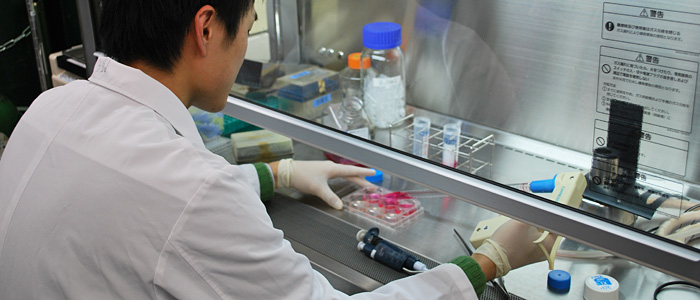
Our mission is education and research about global health and innovative medicine.
Education / Human Resource Development (HRD)
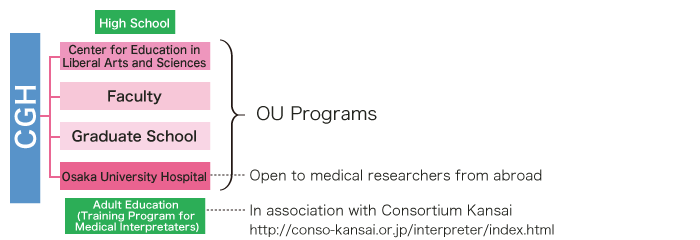
Workshops, Symposia and Other Academic Events Organized by the CGH
- • Go Global !! International Medical Symposium
-
Japan(2013, 2014, 2015, 2016, 2018, 2022 (Hybrid))
San Francisco(2014)
Shanghai(2014)
Groningen(2015)
Bangkok(2016, 2017, 2018, 2019)
Sao Paulo(2016)
Online(2020, 2021) - • Academia Research Development Seminar(2017-)
- • Global Clinical Trial Advanced and Planning Symposium(2017-)
- • International Society of Clinical Medicine Established in 2016・1st Academic meeting・5th Academic meeting(Global Health Joint Conference 2020)
(1) Center for Education in Liberal Arts and Sciences … Basic Science of Health and Medicine・Health and Medical Innovation
This full year subject has been offered since the second semester of 2014. The basic curriculum and syllabus were created the year before after a review of all of the departments, faculties and general requirement programs at OU. At first, the subjecte was required of only first year medical students, but began being offered as a general education subjectcourse and was made a general requirement of the School of Dentistry, in 2015. The subject is also offered as an elective to all years from freshman (first year) to senior (fourth year) in other faculties regardless of affiliation, and has been taught to students in the arts and sciences from diverse schools.
This educational program picks apart the most recent knowledge on innovation and globalization in the health and medical sciences, looking for issues from diverse angles and perspectives. It is basically an omnibus program on international medicine and future healthcare, and is taught by professors from across the academic spectrum at OU who are active at the forefront of innovation and globalization in the health and medical sciences, as well as specialists who are from other universities, research institutes and private businesses both in Japan and abroad.

Students are required to report on what they learn and how they feel after taking the subject, and, through these reports, have demonstrated a flexible mindset with regards to the paradigm shift in medicine that innovation and globalization are fueling, as well as an awareness of new ideas that are not constricted by past preconceptions. This same tendency was verified through surveys conducted at the start and end of the program, and is clear evidence of the success the program is having in helping students acquire a global perspective of healthcare and medicine. It could offer plenty of hope of new human resources needed to promote advanced/international medicine rising from the student body at OU.
(2) Assignment in Basic Medicine
The Assignment in Basic Medicine consists of 51 basic course that, over a period of about 3 months, impart practical training requirements in research activities to third-year medical students at OU. The aim for that is for students to acquire basic skills that will give them a future foundation in medical research. Launched in 2016, the program accepts just four hand-selected students and places a lot of emphasis on student autonomy as a means for stirring interest in international medicine.
- Observation and practical training in medical interpretation and coordination at the Rinku General Medical Center, Osaka
- “Medical Interpreter Development Course” at the OU Nakanoshima Center
- Cooperation in clinical trials (joint research) of a voice-activated translator
- “Introduction to Global Health” at the Tokyo Branch and OU Nakanoshima Center
- Practical training overseas, etc.
| Research Themes | |
|---|---|
| 2016 | Optimizing Japan’s outbound medical and interpretation services: Tour of Sunrise Japan Hospital and interviews with doctors |
| Training in Indonesia: Study of problem-solving techniques and field medical services | |
| Critical factors of communication skills: Training in Indonesia and observation of actual medical services for foreign nationals | |
| Improvements to medical interpretation in Japan learned from medical interpretation in Korea | |
| 2017 | Reflections on emergency care in Japan in comparison to practices around the world |
| Situation of medical examinations of foreign nationals at OUH | |
| Average life-expectancy in Zimbabwe and the future | |
| Comparison of eating disorders in Japan and the USA, and future issues in Japan | |
| 2018 | Medical interpreter certification system in Hungary |
| Japanese medical students residing in Hungary | |
| 2019 | Exploring the promotion of bio-ventures |
| Medical problems in transplant tourism |
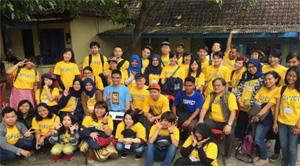
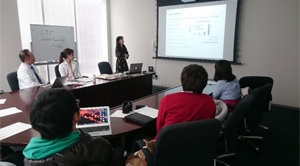
(3) Graduate Program for Advanced Interdisciplinary Studies “Health and Medical Innovation Program”
- Overview and objective: This program helps students look at healthcare and medicine from a global perspective and plan career paths as practitioners, educators or researchers in the field of education and research related to healthcare and medical innovation. The underlying objective is to develop human resources knowledgeable of the following so that they can promote advanced/international medicine.
1) Importance of maintaining one’s health
2) Advantages of healthcare/medical services in Japan and issues that could be further improved
3) Situation of healthcare/medical services overseas
4) The fact that maintaining and improving medical services in Japan and around the world requires a broad range of human resources above and beyond medical professionals (doctors, nurses, technicians, etc.) - Learning target: Students can look at healthcare and medicine from a global perspective and promote advanced/international medicine.
- Students improve their ability to spot and solve issues through lectures, group discussions and presentations that delve into the latest knowledge and information. The 2016 “Advanced Course in Healthcare and Medicine” used lectures, group studies and debates to probe the healthcare and life-expectancy challenges mankind faces for ways to draw the 2025 World Expo to Osaka.
- In addition, discussions of ASEAN healthcare/medicine were held in 2017 and 2018, and of SDGs in 2019.
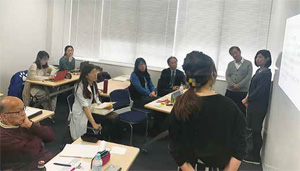
(4) Adult Education Training Program for Medical Interpretater
Alongside the globalization of society, there has been an increase in the number of foreign travelers to Japan for sightseeing or business in recent years. A large number of them are said to be from Asia. Medical tourism has also boomed in recent years, bringing increasing numbers of foreign nationals to Japan for medical examinations and treatment. Moreover, according to data from the Ministry of Justice, the number of registered foreign nationals residing in Japan for study, work, research or other purpose increased in terms of overall number and by country five years in a row from 2011 to 2015, with data for 2015 being 29.34% higher than in 2011.
Naturally, if a foreign resident in Japan becomes sick or hurt, he/she receives medical services at a hospital in Japan. Visitors to Japan can also be involved in unexpected accidents or suddenly fall ill during their stay. Whatever the misfortune, it is viewed as a basic human right that foreign nationals receive the same level of safe and reassured medical care as Japanese people do.
With the Tokyo Olympics and Paralympics coming in 2020, the number of foreign visitors to Japan is expected to rise, therefore hospitals need to be ready for foreign patients who do not speak Japanese or limited Japanese, which makes developing medical interpreters an urgent matter.
To heed the call, this “Training Program for Medical Interpretater” has been open to the general public at the UO Nakanoshima Center since 2015, and turning out medical translators with proper medical knowledge and ethics, and a good understanding of the cultural and religious backgrounds of foreign nationals, in addition to high-caliber linguistic skills.
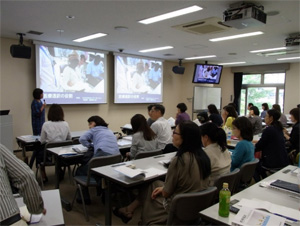
(5) High School – Osaka University Partnership
Osaka University believes a smooth transition from high school to college is instrumental towards improving the quality of the next generation of students and, therefore, has programs to familiarize high school students with the education and research activities at OU. In 2015, OU signed an agreement of cooperation with high schools affiliated with Osaka Kyoiku University. Through this agreement, OU is working with the Hirano Senior High School, which the Ministry of Education, Culture, Sports, Science and Technology designates a “Super Global High School”, on education in the healthcare and medical services field. The program basically involves touring graduate school departments and OUH, and watching parts of a video about Health and Medical Innovation Studies. These high school students have shown strong interest in international medicine and indicated that they would like more programs of the sort and that these programs are positively influencing their future choices. Because these students are coming in contact with healthcare and medical issues in Japan and abroad at a young age when their minds are still malleable, there is reason to believe that they will develop a global perspective of healthcare and medicine, and have great potential as human resources needed in the future,
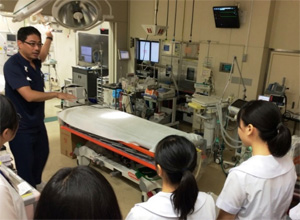
Research
With today’s escalating needs for international healthcare, every year brings yet more symposiums and seminars. The CGH receives speaking requests from all corners of society -- both from within and outside OU, from academia and industry, and from both the public and private sectors. Providing information on our activities at the CGH is vital to making our work known outside of the university and amongst the general public, therefore plans are to continue with these speaking opportunities as an integral part of our messaging.
The CGH also represented OU in establishing the International Society of Clinical Medicine (ICM) in August 2016, in cohort with Hokkaido University, The University of Tokyo and Kyushu University who share similar interests with OU in developing international healthcare. The ICM was created as an academic platform for promoting research and exchanging information on international healthcare. It brings a broad range of human resources, not just from universities and hospitals but also national and local governments, private businesses, and other medical and educational organizations, into a nationwide academic network for exchanging thoughts and ideas. OU is helping to steer the ICM by hosting the very first conference and reporting the school’s diverse research activities.
Research Areas
- Global health
- Medical services for foreign patients
- Medical interpretation
- Project of the Graduate School of Medicine at the Society 5.0 Realization Hub (Osaka University)
- Human resource development for global health fields
(1) The primary diseases concerning global health used to be communicable diseases, but with populations aging and birthrates dropping worldwide, attention is gradually turning towards non-communicable diseases (NCDs) like high blood pressure, cardiovascular disease and cancer. Given the situation, the CGH is working with the countries of Asia through collaborative activities with the ASEAN University Network (AUN) and other ties, to develop joint international research into healthy life-expectancies and reproductive health.
Health risk factors assessment for both communicable diseases and non-communicable diseases among university students in Japan and ASEAN
(2) In conjunction with several other universities, the CGH helped to establish the International Society of Clinical Medicine (ICM) as an academic network concerned with international healthcare. Already before that, the CGH had reported on the systems that needed to be built in order to better provide medical services to foreign patients at seminars and symposiums, but a lot of issues remain unsolved including a loose definition of who is a foreign patient and not knowing exactly how many of them there are. Going forward, the CGH will be looking to cooperate with other universities and hospitals in order to solve these issues.
(3) Because Japan lacks a national certification system for medical interpretation, the CGH began searching for ways to create such a system in 2016 with funding from the Ministry of Health, Labor and Welfare (MHLW) to investigate the current situation and social significance, and design a fair and impartial system. In 2017, a new project aimed at creating a viable certification system for medical interpretation was similarly approved and funded by the MHLW as health and labor sciences research. That project is laying the academic foundations for delivering international healthcare by gathering evidence, proposing how to screen candidates and defining roles, assignments and terminology like medical interpretation and medical services for foreign nationals. The CGH is also participating in multi-institutional clinical trials of a voice-activated translator that was developed from Japanese information-communication technologies for use in medical interpretation.
(4) In September 2018, Osaka University became the only one in Japan to be selected for the Ministry of Education, Culture, Sports, Science and Technology’s Society 5.0 Realization Research Support Project. Global and Innovative Medicine and the Center for Global Health are conducting research on “Research of watching over the first 1,000 days of life”, “Heart failure prevention project”, and “Intelligent infrastructure for preventing and predicting sports injuries” in collaboration with the Departments of Medical Informatics, Obstetrics and Gynecology, Cardiovascular Medicine, and Sports Medicine.
- • “Basic Research on Certification Systems for Medical Interpretation”
Project Leader: Ken Nakata, (Graduate School of Medicine, Osaka University)
Health Labor Sciences Research Grant, Local Medical Infrastructure Research & Development - https://mhlw-grants.niph.go.jp/niph/search/NIDD00.do?resrchNum=201620052A
- • “Research on Implementing Japanese Certification Systems for Medical Interpretation”
Project Leader: Ken Nakata, (Graduate School of Medicine, Osaka University)
Health Labor Sciences Research Grant, Local Medical Infrastructure Research & Development - https://mhlw-grants.niph.go.jp/niph/search/NIDD00.do?resrchNum=201721060A
- • “Creation of a Platform for Developing Human Resources for International/Future Healthcare”
MEXT Program for the Creation of Human Resource Development Platforms for Future Healthcare - http://www2.med.osaka-u.ac.jp/cgh/thinkg/
Published Papers
- Shi, Kenrin., Nakata, Ken., Ogasawara, Yukiko., & Minamitani, Kaori. Iryo no Kokusaika no Igi to Osakadaigaku no Torikumi [Significance of the Internationalization of Healthcare and Related Undertakings at Osaka University]. Nihon Seikeigekagakkai Zasshi [Journal of The Japanese Orthopaedic Association] 89 (2); S2, 2015.
- Ogasawara,Yukiko., Nakata, Ken., Minamitani, Kaori., Shi, Kenrin., & Sawa, Yoshiki. Nihon ni Okeru Kokusai Iryo no Kadai – Osakadaigaku Igakubu Fuzoku Byoin Kokusai Iryo Senta no Torikumi [Issues in International Healthcare in Japan: Undertakings of the Center for Global Health, Osaka University Hospital] Miraikyoseigaku 2; 141 – 161, 2015.
- Yamada, Eri., Minamitani, Kaori., Shi, Kenrin., Yamazaki, Keita., Ogasawara, Yukiko., Tabata, Chisa., & Nakata, Ken. Kokuritu Daigaku Byoin deno Gaikokujin Kanja Shinryo to Kaigai Iryo Jujisha Kensyu no Ukeire [Medical Services for Foreign Patients and Training for Foreign Medical Practitioners at National University Hospitals] Nihon Toko Igaku Kaishi in press [Journal of The Japanese Society of Travel and Health] 2017.
- Nakatani, Hiroki. Global Strategies for the Prevention and Control of Infectious Diseases and Non-Communicable Diseases. Journal of Epidemiology 26 (4): 171 – 178; 2016.
- Nakatani, Hiroki. Aratana Gurobaru Herusu no Paradaimu – WHO to Nihon eno Inpakuto – [A New Paradigm in Global Health: The Impact on the WHO and Japan] Hokennokagaku 58 (2): 81 – 85; 2016.
- Nakatani, Hiroki. Nihon no Gurobaru Herusu Jinzai [Global Health Human Resources in Japan] Koshueisei 80 (5): 362 – 366; 2016.
- Tabata, Chisa., & Nakata, Ken. Iryo Tsuyaku no Ninsho ni Mukete [Approaches in Medical Interpretation Certification]. Kokai Paneru Disukasshon Hokoku. [Open Panel Discussion Report] Kokusai Rinsyo Igakukai Zasshi [Journal of The International Society of Clinical Medicine] 1 (1): 58 – 59; 2017.
- Tabata, Chisa., Nakatani, Daisaku., Minamitani, Kaori. & Nakata, Ken. Nihon ni Okeru Gaikokujin Shinryo no Kadai [Issues in Medical Services for Foreign Patients in Japan]. Daigaku Byoin ni okeru Iryo Tsuyaku to Kotoba no Sakini aru Mondai [Medical Interpretation at University Hospitals and Problems Beyond Language]. Kokusai Rinsyo Igakukai Zasshi. [Journal of The International Society of Clinical Medicine] 2 (1): 35 – 38; 2018.
- Nakata, Ken., Nakamura, Yasuhide., Oshimi, Takayuki., Yamahata, Seishiro., Itoigawa, Miki., Yamada, Hideomi., Okamura, Serina., Minamitani, Kaori., Tabata, Chisa., & Yamasaki, Keita. Iryo Tsuyakushi Nintei Seido no Hossoku to Hatten [Establishing and Developing a Medical Interpreter Certification System]. Kokusai Rinsyo Igakukai Zasshi [Journal of The International Society of Clinical Medicine] 3 (1): 28-36; 2019
- Nakata, Ken., & Tabata, Chisa. Honpo ni Okeru Iryo Tsuyaku no Genjo to Sono Kadai [Current Situation and Issues of Medical Interpretation in Japan] Nihon Ishikai Zasshi [The Journal of the Japan Medical Association] Vol. 147, No. 12, 2465-2469; 201903
Publications
- Edited by Nakata, Ken. & Yamazaki, Keita. Kokusai Mirai Iryogaku – Kenko Iryo Inobeshon [International Medicine & Future Healthcare: Healthcare and Medical Innovation]. Osaka Daigaku syuppan Kai [Osaka University Press] Sep. 2017.
- Edited by Osaka Daigaku Iryo Tsuyaku Yosei Kosu Kyokasho Hensyu Iinkai [Textbook for Medical Interpreting]. Tsuyakusha no Tame no Iryo no Chishiki Hoikusha [Textbook Committee for Osaka University’s Medical Interpreter Development Course, Hoikusha] April 2018.
- Tabata, Chisa., et al. Kenshu Noto No. 104 Gaikokujin Kanja e no Taio to Ryuiten [Training Notebook No. 104: Dealing with Foreign Patients and Points to Keep in Mind]. Nihon Sanfujinkai Kai [Japan Association of Obstetricians and Gynecologists] Feb. 2020
















